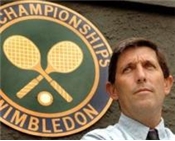
Surrounded in his office by screens with feeds from every court at Wimbledon, it appears tournament referee Andrew Jarrett has the best seat in the house.
But, ironically, despite overseeing the prestigious Grand Slam competition, Jarrett rarely gets to see any tennis at all.
"I'll occasionally see a bit but, generally, I'm only really looking at them for incidents, if somebody is wearing a dodgy shirt and so on," said Jarrett.
"But I usually get to watch the finals because it is getting towards the end of the tournament and it is not quite as busy."
Missing some of the action, however, is the last thing which bothers Jarrett – because he sees plenty of action of his own.
From deciding when to close the roof on Centre Court to reprimanding players for unsportsmanlike conduct, the 54-year-old already has his hands full.
Belper-born Jarrett's busy day starts about 9am, at least an hour before the gates are opened for the crowds and more than two hours before play begins.
Meetings quickly kick off the day and among the hot topics of conversation is always the weather.
Already this year, matches in many sections of the competition – men's singles, men's doubles, women's singles and women's doubles – have been postponed because of rain.
While six matches were postponed on Monday because of bad light, 19 matches – four of which had not been assigned a court – were either suspended or cancelled completely after late rain finished play early.
By Wednesday, 22 matches were postponed or called off by close of play – rain, again, breaking up proceedings during the afternoon, before bad light finished them.
But, importantly for Jarrett, all of the men's and women's first-round matches were finished by Wednesday, allowing his team to focus on making sure the second round completed.
Jarrett, who is used to re-writing the order of play several times a day, said: "It's not easy. This is something which is not really in your control but is still a major part of the tournament.
"I always say every year that you can never be ahead but you can be behind.
"That's why the most important thing is not to get out of sync within the draws – you can't play a third round before the second round and so on."
And, as Jarrett has often said, officials can only have an inkling of what the weather might be like, with predictions changing all the time.
In one of his morning meetings, the referee learns the forecast has changed from 20% to 30% chance of rain in the morning to a 50% likelihood of showers late afternoon, depending on the height of the clouds.
Jarrett said: "Sometimes it can be about when the rain falls, as opposed to how often it falls, as to how it affects the tournament.
"And it's not just the rain itself to be considered, it's also the dampness of the atmosphere and how that affects the courts."
But, while the rain might be a concern for the officials and the spectators, it is something which is all too familiar for the players.
The world number 25 and 2003 US Open champion Andy Roddick told the Derby Telegraph his philosophy was not to worry about the rain.
He said: "You just kind of chill out and when they say: 'Go', you go. I'm not sure it's rocket science how to get through it. It's frustrating for everybody."
He added: "You can't really stress about what's out of your control. I've done it a million times.
"I think the last time I played a final here was the only time in five Slam finals where I hadn't had to play on Saturday before – and then Friday before a couple of times.
"You just do it. It's not always perfect but you just try to get through."
And, when it comes to deciding the order of play for each day, Jarrett gets a little bit of help from the computer.
The program used to put the schedule together has the ability to colour code any matches which it believes are a concern.
For example, red will indicate a clash – where a player's singles and doubles match have been scheduled to take place at the same time – while amber and green suggest less serious conflicts.
Back in Jarrett's office, his next job of the day requires dealing with two doubles players over the phone – who are stuck in traffic but desperate to sign the lucky losers' list, should any of their colleagues drop out.
But Jarrett is clear and to the point with them – if their names are not on the list by 11am, nothing can be done. That is the rule.
He also takes the time to look at photos of the damage caused by Australian Bernard Tomic, who smashed two rackets and received a code violation after losing his opening-round match 3-6, 6-3, 6-4, 6-4 to Wimbledon debutant David Goffin.
The pictures from court two are not pretty and it is clear it will take a long time to repair the damage. And it will be Jarrett's call to decide the conclusion to this matter, usually in the form of a fine.
Much of Jarrett's day is spent in the office, where he gets the clearest view of matters all over SW19. But he will occasionally trek down to the courts themselves, perhaps to welcome players to Centre Court or to resolve a dispute.
Although he might not get to see much tennis, Jarrett says he loves playing his part in Wimbledon.
He added: "Every single year at Wimbledon has its own stories and memories and, together, they create chapters of a history which I am proud to be involved in."
Courtesy of Derby Telegraph